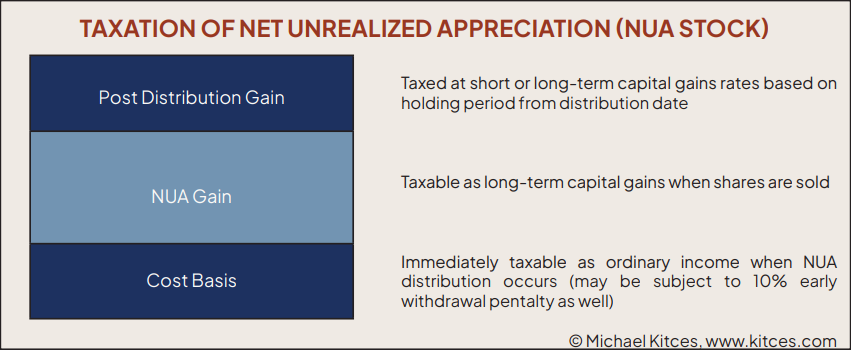If your employer grants company stock in your 401(k), you may be subject to income tax on capital gains when it comes time to distribute that account.
Larger publicly-traded companies frequently use company stock to reward employees and provide them with a stake in the business. Stock may be granted to employees in the form of profit-sharing contributions to 401(k) accounts, or employees may be able to purchase shares, sometimes at a discount, within their retirement plan. While this is a good way to give employees a sense of ownership and reward them for hard work, it can also potentially result in a significant tax bill since employer stock is taxed as ordinary income rather than at capital gains rates when distributed. In this article, we explore the Net Unrealized Appreciation tax strategy to help mitigate the potential tax impact of employer stock when it is distributed from a retirement plan.
By contributing shares of company stock to employee retirement plans, businesses can provide their workers with profit sharing incentives and receive a tax deduction without a cash outlay. The downside to the employee is that this stock will be taxed as ordinary income once it is distributed from the plan, rather than the capital gains rates that would be applicable had the stock been purchased outside of a retirement plan. In order to provide some tax relief to employees, the IRS allows for use of capital gains rates if certain conditions are met. This is known as Net Unrealized Appreciation provisions.
Net Unrealized Appreciation (NUA) is the difference in value between the average cost basis of your shares and the current market value. The NUA rules specify that the cost basis on company stock distributed in-kind, in a lump sum, following a qualifying event will be immediately taxed as ordinary income. The capital gain on those shares at the time of distribution, however, will be taxed at long-term capital gains rates, regardless of the actual holding period. When the shares are ultimately sold, any additional capital gain will be taxed at either short- or long-term capital gains rates, based upon the holding period following the distribution date.

In order to qualify for NUA treatment of the capital gains on your stock, the following conditions must be met:
- Company stock must be distributed in-kind. This means that the shares cannot be sold before they are withdrawn from the retirement plan. Instead, the shares must be transferred directly into a taxable investment account. Stock options and “phantom stock” are not eligible for NUA treatment.
- A lump-sum distribution is required. In order to take advantage of the NUA strategy, the entire plan balance must be distributed in one tax year. This means that all holdings in the retirement plan must be withdrawn, not just the company stock. Depending on the plan participant, the portion of the account not held in company stock may be rolled directly into an IRA.
- The distribution must be made following a ‘qualifying event’. A ‘qualifying event’ in this case refers to a separation from service, death or disability. Those ages 59 ½ and older can also qualify, provided the terms of their retirement plan allow for in-service distributions.
It’s important to note that even if the other requirements are met, a distribution into a taxable investment account prior to age 59 ½ may result in a 10% tax penalty on the distributed assets, in addition to the ordinary income tax due on the average cost basis of the shares. It is also worth noting that NUA gain is not eligible for a step-up of cost basis at death but is also not subject to the 3.8% Medicare surtax on net investment income that applies to those in higher tax brackets.
The capital gains tax on the unrealized gain above cost basis (the NUA) will not be due until the shares are sold, at which time additional short- or long-term capital gains tax may be due based on the holding period after the shares are distributed from the plan.
This is a complex and nuanced strategy that requires careful analysis and consideration. It is imperative to discuss your options and the potential implications of all available distribution strategies before taking any action. If you own company stock within your 401(k), we encourage you to reach out to your Freestone Client Advisor to discuss your options.
Important Disclosures: Nothing in this document is intended to provide, and you should not rely upon it for, accounting, legal, tax, or investment advice or recommendations. We are not making any specific recommendations regarding any retirement tax strategies, and you should not make any decisions regarding such strategies based on the information in this document. The intention of this document is educational, and it is intended only to discuss limited aspects of this specific retirement tax strategy in general terms. This document is not a comprehensive or complete summary of considerations regarding this specific retirement tax strategy. Each individual is in a different situation and has different items to address, and the options in this document are not appropriate for everyone. Please consult your Freestone client advisor regarding options specific to your needs.
